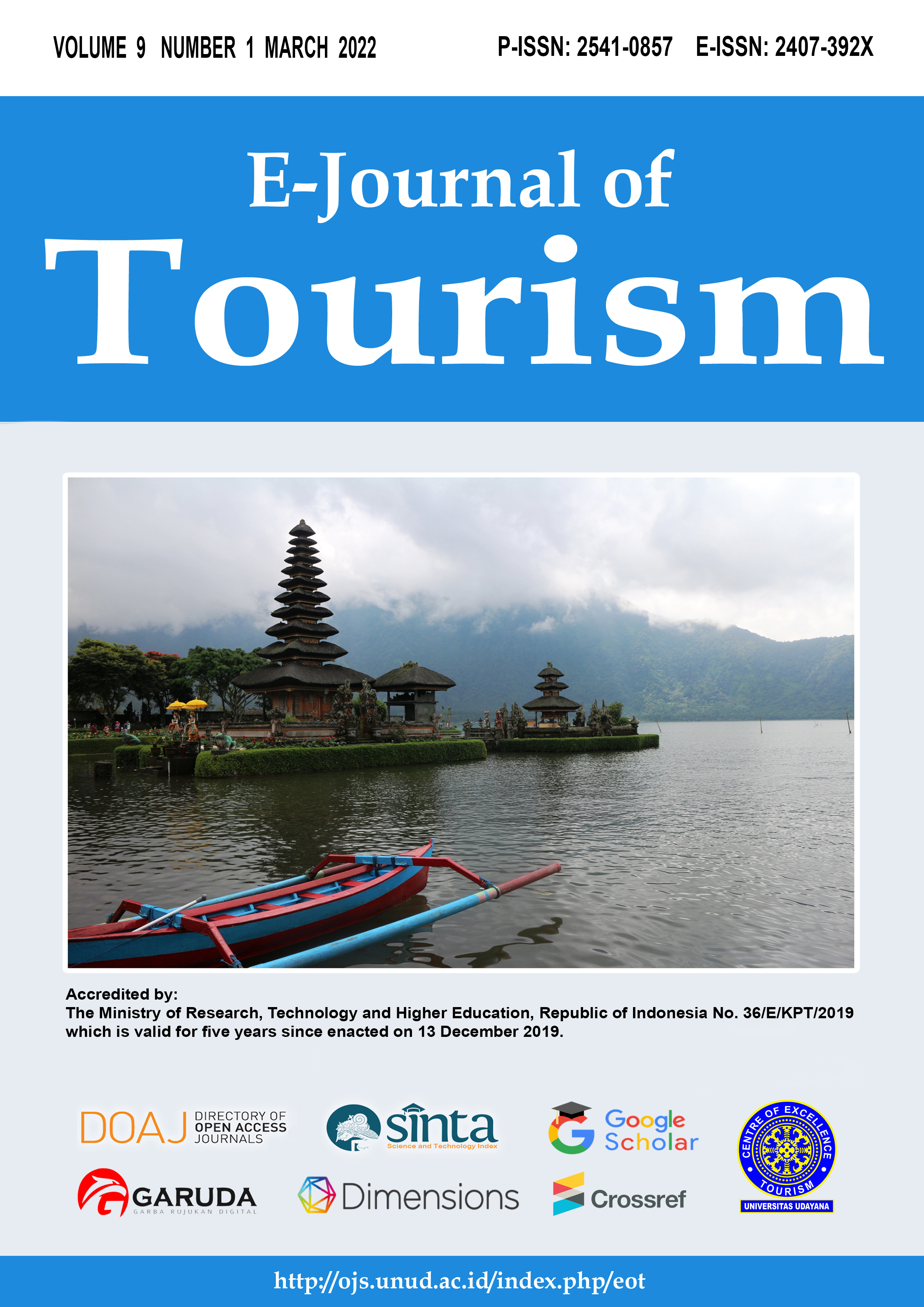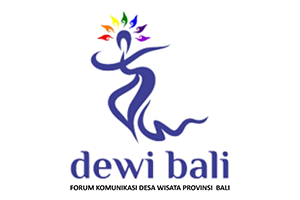The Government Support on Women Entrepreneurial Intention Affected by Layoffs in Tourism Industry
Abstract
This study discusses the model of local government support to generate entrepreneurial intentions for women who have been laid off due to the Covid-19 pandemic. There are four government support as the intervention variable tested, financial support, assistance in design and production, supply chain coordination, and marketing and sales support. While the research object context is the internal locus and external locus of control, acting as exogenous variables. The survey used a questionnaire designed using a 5-point Likert scale. Questionnaires were distributed to women affected by layoffs who live in Minahasa Utara Regency, Sulawesi Utara Province, Indonesia, a total of 75 questionnaires were answered completely. Data analysis using Smart PLS. The results of data analysis show that, without government support intervention, women with an internal locus of control are more interested in becoming entrepreneurs than those with an external locus of control. Government support has a significant impact in generating entrepreneurial interest in women with internal and external locus of control. Women with an external locus of control are more motivated to become entrepreneurs, especially if they receive financial support, while women with an internal locus of control are more motivated to become entrepreneurs if they are supported in supply chain development. Government support for coordinating supply chains adds to the literature on external factors that have an impact on entrepreneurial intentions. The managerial implication of the findings of this study is the importance of the government's role, especially in financial support for women with external locus of control and supply chain support for women with internal locus of control.
Downloads
References
Auna, M. S. S. (2020). Locus of Control and Self-Efficacy on Entrepreneurial Intentions in the Digital Age. Advances in Social Science, Education and Humanities Research, 395, 289-292. DOI: 10.2991/assehr.k.200120.061
Badan Pusat Statistik. (2020). Retrieved from https://www.bps.go.id/pressrelease/2020/11/05/1673/agustus-2020--tingkat-pengangguran-terbuka--tpt--sebesar-7-07-persen.html
Bernardus, D., Murwani, F. D., Ardyan, E., Padmawidjaja, L., Aji, I D. K., Jatiperwira, S. Y. & Hermanto, Y. B. (2020). Which psychological characteristics strengthen “The entrepreneurial intention-action relationship”?: An extension of the theory of planned behavior. Cogent Business & Management, 7(1), 1823579. DOI: 10.1080/23311975.2020.1823579
BPS Kabupaten Minahasa Utara. (2020). Retrieved from https://minutkab.bps.go.id/indicator/16/79/1/jumlah-wisatawan-mancanegara-dan-domestik-di-kabupaten-minahasa-utara.html
Cater, J. J., Young, M., Al-Shammari, M. & James, K. (2021). Re-exploring entrepreneurial intentions and personality attributes during a pandemic. Journal of International Education in Business, 2046-469X. DOI 10.1108/JIEB-04-2021-0050
Fitzgerald, C. S. & Clark, S. (2013). Work Locus of Control and Perceptions of Practice. Journal of Public Child Welfare, 7(1), 59-78. DOI: 10.1080/15548732.2012.738185
Ghozali, I. (2014). Structural Equation Modeling, Alternative Methods with Partial Least Square (PLS). Ed. 4., Semarang: Badan Penerbit Universitas Diponegoro
Gui, P., Ji, X., Mei, Y. & Quan, Z. (2021). Analyzing a community worker’s stress during the COVID-19 pandemic in China. Kybernetes, vol. ahead-of-print no. ahead-of-print. DOI: 10.1108/K-10-2020-0679
Gunawan & Sugiyanto. (2011). Kondisi sosial ekonomi keluarga pasca pemutusan hubungan kerja. Jurnal Penelitian dan Pengembangan Kesejahteraan Sosial, 16(1), 35-52
Hallam, C., Zanella, G., Dorantes Dosamantes, C.A. & Cardenas, C. (2016), Measuring entrepreneurial intent? Temporal construal theory shows it depends on your timing, International Journal of Entrepreneurial Behavior & Research, 22(5), 671-697. DOI: 10.1108/IJEBR-09-2015-0202
Hsiao, C., Lee, Y., & Chen, H. (2015). The effects of internal locus of control on entrepreneurship: The mediating mechanisms of social capital and human capital. The International Journal of Human Resource Management, 27(11), 1158-1172. DOI: 10.1080/09585192.2015.1060511
KEK Likupang Sulut. (2019). Retrieved from https://bob.kemenparekraf.go.id/1656-kek-likupang-sulut-masuk-5-destinasi-super-prioritas/
Kreitner, R. & Kinicki, A. (2012). Organizational Behavior. 10th ed., McGraw-Hill Education
Krichen, K. & Chaabouni, H. (2021). Entrepreneurial intention of academic students in the time of COVID-19 pandemic. Journal of Small Business and Enterprise Development, 1462-6004. DOI: 10.1108/jsbed-03-2021-0110
Lee-Ross, D. (2017). An examination of the entrepreneurial intent of MBA students in Australia using the entrepreneurial intention questionnaire. Journal of Management Development, 36(9), 1180-1190. DOI: 10.1108/JMD-10-2016-0200
Li, G., Pervaiz, S., & He, Q. (2021). Can Universities be a Gleam of Hope During COVID-19? Entrepreneurial Intentions Approach for Academia in Pakistan. Frontiers in Education, 6(717532). DOI: 10.3389/feduc.2021.717532
Marri, H. B., Nebhwani, M., & Sohag, R. A. (2011). Study of Government Support System in SMEs: an Empirical Investigation. Mehran University Research Journal of Engineering & Technology, 30(3), 435-446. file:///C:/Users/Asus/Downloads/Study_of_Government_Support_System_in_SMEs_An_Empi.pdf
Mashudi, Sudirman, I W., Murjana Yasa, I G., & Saskara, I A. (2018). Effect of government role, social capital and orientation of social entrepreneurship on performance of village credit institution in Bali province, Indonesia. Russian Journal of Agricultural and Socio-Economic Sciences, 83(11), 84-102. DOI: 10.18551/rjoas.2018-11.10
Moriano, J. A., Gorgievski, M., Laguna, M., Stephan, U. & Zarafshani, K. (2011). A Cross-Cultural Approach to Understanding Entrepreneurial Intention. Journal of Career Development, 39(2), 162–185. DOI: 10.1177/0894845310384481
Nasip, S., Amirul, S. R. and Sondoh Jr., S. L. (2017). Psychological characteristics and entrepreneurial intention: A study among university students in North Borneo, Malaysia. Education + Training, 59(7/8), 825-840. DOI: 10.1108/ET-10-2015-0092
Novel Coronavirus. (2021, November 27). Retrieved from https://www.who.int/indonesia/news/novel-coronavirus
Nziku, D. M. & Henry, C. (2020). Policies for supporting women entrepreneurs in developing countries: The case of Tanzania. Journal of Entrepreneurship and Public Policy, 10(1), 38-58. DOI: 10.1108/jepp-09-2020-0073
Parvin, M., Tavakolinia, J., Mosammam, H. M., & Razavian, M. (2021). The economic impacts of COVID-19 on the city tourism-related services; the case of Tehran. International Journal of Tourism Cities, ahead-of-print(ahead-of-print). DOI: 10.1108/ijtc-06-2021-0128
PHRI. (2020, March 5). Retrieved from https://www.republika.co.id/berita/q6pn8m370/phri-sebut-okupansi-hotel-turun-jadi-20-persen
RI, K. (2021). Tren Pariwisata Indonesia di Tengah Pandemi. Retrieved from https://kemenparekraf.go.id/ragam-pariwisata/Tren-Pariwisata-Indonesia-di-Tengah-Pandemi
Ringle, C. M., Wende, S., & Becker, J.-M. (2015). SmartPLS 3, Boenningstedt: SmartPLS GmbH, http://www.smartpls.com
Tambunan, T. H. T. (2011). Development of small and medium enterprises in a developing country. Journal of Enterprising Communities: People and Places in the Global Economy, 5(1), 68–82. doi:10.1108/17506201111119626
Tarigan, M. (2020). 3 Dukungan Yang Harus Diberikan jika Pasangan jadi Korban PHK. Retrieved from https://gaya.tempo.co/read/1344464/3-dukungan-yang-harus-diberikan-jika-pasangan-jadi-korban-phk

This work is licensed under a Creative Commons Attribution 4.0 International License.
The copyright of the received article shall be assigned to the journal as the publisher of the journal. The intended copyright includes the right to publish the article in various forms (including reprints). The journal maintains the publishing rights to the published articles.




















